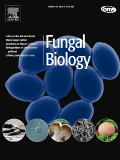
Fungal Biology
Scope & Guideline
Exploring the Intricacies of Fungal Life
Introduction
Aims and Scopes
- Ecological and Environmental Mycology:
Research focusing on the ecological roles of fungi in ecosystems, including their interactions with plants, animals, and other microorganisms, as well as their contributions to nutrient cycling and ecosystem functioning. - Pathogenic Fungi and Plant Diseases:
Studies that investigate the mechanisms of fungal pathogenesis, the impact of fungal diseases on agriculture, and the development of biocontrol strategies to manage plant pathogens. - Fungal Diversity and Taxonomy:
Exploration of fungal biodiversity, including the identification and characterization of new species, and the phylogenetic relationships among various fungal taxa. - Fungal Biotechnology and Applications:
Research aimed at harnessing fungal metabolism for biotechnological applications, including enzyme production, bioremediation, and the development of antifungal agents. - Molecular and Cellular Mycology:
Investigations into the molecular mechanisms underlying fungal growth, development, and pathogenicity, including gene expression studies and proteomic analyses.
Trending and Emerging
- Fungal-Plant Interactions and Mycorrhizal Studies:
There is an increased focus on the symbiotic relationships between fungi and plants, particularly mycorrhizal associations, which are essential for understanding plant health and ecosystem dynamics. - Fungi in Climate Change Research:
Research examining the impact of climate change on fungal species and their ecological roles is gaining momentum, highlighting the importance of fungi in environmental sustainability and adaptation. - Fungal Genomics and Metagenomics:
Advancements in sequencing technologies have led to a rise in studies utilizing genomic and metagenomic approaches to explore fungal diversity and functional potential in various environments. - Biocontrol Agents and Sustainable Agriculture:
An emerging trend is the exploration of fungal species as biocontrol agents against pests and diseases, reflecting a growing interest in sustainable agricultural practices. - Fungal Bioremediation and Environmental Applications:
Research on the use of fungi for bioremediation of contaminated environments is increasingly prominent, as scientists seek environmentally friendly solutions to pollution.
Declining or Waning
- Traditional Medicinal Fungi:
Research on the medicinal properties of traditional fungi has decreased, possibly due to the growing interest in novel and less-studied fungal species or compounds. - Fungal Physiology in Controlled Environments:
Studies centered on fungal physiology under strictly controlled lab conditions are becoming less frequent, with a shift towards more ecologically relevant studies that consider environmental variability. - Fungal Pathogen Resistance Mechanisms:
There has been a noticeable decline in publications specifically addressing the resistance mechanisms of fungal pathogens, as the focus shifts towards integrated pest management and holistic approaches to disease control.
Similar Journals
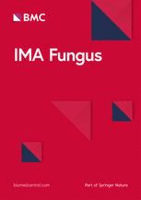
IMA Fungus
Fostering Innovation in Ecological Research.IMA Fungus is an esteemed open-access journal published by BMC, dedicated to advancing research in the fields of fungi, plant sciences, and ecological systems. With an ISSN of 2210-6340 and E-ISSN 2210-6359, this journal has been an influential platform since its inception in 2010, contributing significantly to the scientific community in the United States and beyond. The journal’s remarkable impact can be seen in its Q1 quartile rankings across multiple categories, including Agricultural and Biological Sciences, Ecology, Evolution, Behavior and Systematics, and Plant Science, positioning it among the top literary sources in these fields. Notably, IMA Fungus holds impressive Scopus rankings, with the Agricultural and Biological Sciences category placing it in the 98th percentile, evidencing its crucial role in disseminating impactful research. Given its commitment to fostering accessibility and collaboration, IMA Fungus continues to be an invaluable resource for researchers, professionals, and students aiming to explore and understand the complex roles of fungi within various ecosystems.
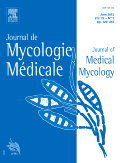
JOURNAL DE MYCOLOGIE MEDICALE
Advancing Understanding of Fungal InfectionsJOURNAL DE MYCOLOGIE MEDICALE is a premier publication in the field of infectious diseases, particularly focusing on the study of mycology and its clinical implications. Published by MASSON EDITEUR, this esteemed journal is based in France and has been disseminating valuable research since its inception in 1994. With an ISSN of 1156-5233 and an E-ISSN of 1773-0449, it plays a critical role in advancing knowledge in mycological infections, positioning itself in the Q3 category for infectious diseases as per the 2023 quartiles. As indicated by its ranking in Scopus, ranking #142 out of 344 in the medicine-infectious diseases category, the journal maintains a prominent presence within the academic community, appealing to researchers, healthcare professionals, and students alike. Although access options are not open access, the journal endeavors to promote a deeper understanding of mycological studies that are crucial for combating ongoing and emerging infectious threats. As it continues to converge on new findings up to 2024, JOURNAL DE MYCOLOGIE MEDICALE remains an essential resource for those invested in the critical intersections of mycology and medicine.
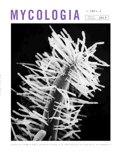
MYCOLOGIA
Innovative insights into fungal biology and ecology.MYCOLOGIA, published by Taylor & Francis Inc, is a prestigious journal that has been at the forefront of fungal research since its inception, with converging years of publication from 1945 to 2024. This interdisciplinary journal, identified by ISSN 0027-5514 and E-ISSN 1557-2536, stands out in various scientific categories, achieving Q1 rankings in Ecology, Evolution, Behavior and Systematics, as well as Plant Science, alongside strong performances in Cell Biology and Molecular Biology categories. With an impact factor that reflects its significance in the field, MYCOLOGIA appeals to a diverse audience, including researchers, professionals, and students dedicated to advancing the understanding of fungal biology and its ecological implications. Notably, while it does not currently operate under an Open Access model, the journal remains a vital resource for those pursuing groundbreaking discoveries in mycology and related disciplines.
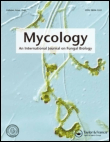
Mycology-An International Journal On Fungal Biology
Connecting Global Minds in MycologyMycology: An International Journal on Fungal Biology, published by Taylor & Francis Ltd, stands at the forefront of fungal research, facilitating the dissemination of knowledge across the diverse fields of infectious diseases, microbiology, and plant science. Established as an Open Access journal since 2010, it offers researchers free and immediate access to high-quality articles that advance our understanding of fungal biology and its applications. With a commendable ranking in Q2 for Infectious Diseases and Microbiology, and Q1 for Plant Science as of 2023, it positions itself as a vital resource for the global scientific community. The journal, conveniently located in the United Kingdom, is committed to publishing rigorous research that stimulates discussion and fosters collaboration among academics, practitioners, and students alike. By providing a platform for innovative studies and critical reviews, Mycology continues to play an essential role in unraveling the complexities of fungal organisms and their profound implications in health, agriculture, and ecosystem dynamics.
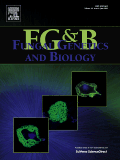
FUNGAL GENETICS AND BIOLOGY
Elevating Knowledge in Fungal Genetics and BiologyFungal Genetics and Biology is a leading peer-reviewed journal published by Academic Press Inc, Elsevier Science, dedicated to advancing the understanding of fungi through innovative genetic and biological research. Since its inception in 1996, this journal has served as a vital platform for the dissemination of critical findings in the fields of Genetics and Microbiology, maintaining a distinguished Q2 category ranking in both disciplines as of 2023. With an ISSN of 1087-1845 and an E-ISSN of 1096-0937, the journal emphasizes the intersection of genetics and molecular biology to explore fundamental questions related to fungal biology that are of paramount importance to various applications in biotechnology, medicine, and environmental science. Researchers, professionals, and students alike will find this journal invaluable as it not only covers current trends and breakthroughs but also encourages collaborative efforts across the scientific community. Fungal Genetics and Biology continues to shape the future of fungal research well into 2024 and beyond, offering rich insights and open access options for a global audience.
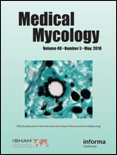
MEDICAL MYCOLOGY
Pioneering Insights into Clinical MycologyMEDICAL MYCOLOGY, published by Oxford University Press, is a premier journal dedicated to the study of fungal infections and their clinical implications. With an ISSN of 1369-3786 and an E-ISSN of 1460-2709, this journal has established itself as a vital resource in the fields of Infectious Diseases and Medicine, holding a respectable Q2 ranking for both categories and a Q1 ranking in the veterinary sector in 2023. Spanning a rich history from 1962 to 2024, MEDICAL MYCOLOGY serves as a platform for innovative research, case reports, and review articles that contribute to the understanding and management of mycological diseases. The journal's commitment to advancing knowledge is reflected in its Scopus rank of #120 out of 344 in Medicine - Infectious Diseases, positioning it within the 65th percentile. With open access options available, it aims to ensure that critical research is accessible to a global audience, enhancing collaboration and knowledge sharing among researchers, healthcare professionals, and students alike.
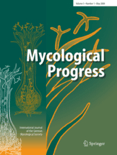
MYCOLOGICAL PROGRESS
Connecting scientists to shape the future of fungal science.MYCOLOGICAL PROGRESS, published by SPRINGER HEIDELBERG, is an esteemed journal dedicated to advancing the field of mycology and associated biological disciplines. With an ISSN of 1617-416X and an E-ISSN of 1861-8952, this journal has established itself as a leading source of high-quality research, evidenced by its impressive rankings in the Q1 quartile across various categories such as Agricultural and Biological Sciences, Ecology, and Plant Science. As of 2023, MYCOLOGICAL PROGRESS ranks 37 out of 193 in Agricultural and Biological Sciences (miscellaneous) and 183 out of 721 in Ecology, demonstrating its significant impact in the ecosystem of scientific literature. This journal not only aims to disseminate innovative research findings but also strives to foster interdisciplinary collaboration among scientists, ecologists, and agriculturists around the globe. While retaining a traditional model of publication, MYCOLOGICAL PROGRESS remains crucial for those seeking to deepen their understanding of fungal biology and its broader environmental implications.
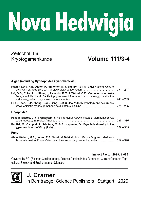
NOVA HEDWIGIA
Advancing the Frontiers of Ecology and EvolutionNOVA HEDWIGIA is a premier journal dedicated to the fields of ecology, evolution, behavior, and systematics, as well as plant sciences. Published by GEBRUDER BORNTRAEGER in Germany, this journal serves as a vital platform for researchers, professionals, and students seeking to disseminate and engage with high-quality studies and findings. With an ISSN of 0029-5035 and an E-ISSN of 2363-7188, NOVA HEDWIGIA has established its significance within these disciplines, reflected in its current Scopus rankings, which place it in the third quartile of both ecology and plant science categories. This esteemed publication has contributed to the advancement of knowledge and innovation since its inception in 1993, continuing through 2024, offering valuable resources for an ever-evolving academic landscape. Researchers looking to contribute to ecological studies or plant sciences will find NOVA HEDWIGIA an ideal venue for sharing their work, nurturing their academic pursuits, and joining a community passionate about the natural sciences.
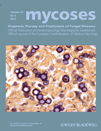
MYCOSES
Illuminating the complexities of mycology and medicine.MYCOSES is a renowned academic journal published by Wiley, specializing in the fields of Dermatology, Infectious Diseases, and general Medicine, with a commendable focus on mycological research and its clinical implications. Established in 1957, this journal has significantly contributed to advancing our understanding of fungal diseases, offering a platform for high-quality research that ranks among the top in its categories—achieving Q1 status in Dermatology and Q1 in Medicine (miscellaneous), while maintaining a strong Q2 ranking in Infectious Diseases. With an impressive Scopus ranking of #5 in Medicine - Dermatology, MYCOSES occupies a pivotal position in the dissemination of critical findings and innovative practices within the scientific community. Although it is not an open-access journal, MYCOSES continues to attract a wide array of researchers, professionals, and students seeking to enhance their knowledge and keep abreast of the latest developments in mycology. Overall, MYCOSES not only serves as an essential resource for academia but also plays a vital role in shaping future research directions and clinical approaches to fungal infections.
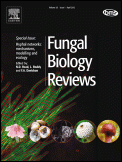
Fungal Biology Reviews
Advancing Knowledge in Fungal BiologyFungal Biology Reviews is a premier academic journal published by Elsevier Science Ltd, focusing on the rapidly evolving field of fungal biology. With an ISSN of 1749-4613 and an E-ISSN of 1878-0253, this journal has established itself as a leading resource for researchers, academics, and professionals dedicated to advancing our understanding of fungi and their ecological, agricultural, and medical implications. As a testament to its impact and quality, Fungal Biology Reviews holds a distinguished Q1 classification in both Microbiology and Plant Science categories for 2023, with a notable rank of 26 out of 182 in the Microbiology category. The journal uniquely blends comprehensive reviews that synthesize current research findings with forward-looking perspectives that pave the way for future studies, making it indispensable for anyone involved in fungal research. Although it operates under a traditional access model, its commitment to fostering impactful scholarship ensures that it remains relevant and widely cited within the academic community. Spanning from its inception in 2007 through to its projected conclusion in 2024, Fungal Biology Reviews continues to shape the framework for future discoveries in fungal biology.